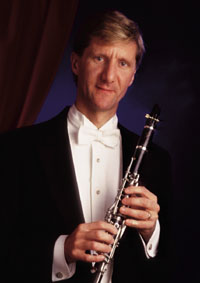 David H. Thomas has been an orchestral clarinetist for 25 years. Additionally, he is also an experienced soloist, with numerous critically acclaimed performances.
David H. Thomas has been an orchestral clarinetist for 25 years. Additionally, he is also an experienced soloist, with numerous critically acclaimed performances.
Starting his performing career directly after undergraduate studies, he won a position with the Greensboro Symphony in 1982. The next year he was offered the principal position of the Kennedy Center Opera House Orchestra in Washington, DC. The grueling demands of opera and ballet repertoire honed his skills as a versatile player. In 1989, he won the principal clarinet position of the Columbus Symphony in Ohio.
A noted orchestra among several giants in Ohio, the Columbus Symphony had its Carnegie Hall debut in 2001. The review was glowing.
For the past 16 years David has impressed audiences with his music making, both as orchestral and solo performer. Columbus Dispatch chief critic Barbara Zuck offered these comments in a 1994 review of Thomas' rendition of Rossini's Introduction, Theme and Variations:
"Thomas, ...has steadily grown in stature and confidence. Even so, I'm not sure anyone was prepared for the absolutely bravura display of virtuosity Thomas delivered last night. Who would have expected him to emerge as the clarinet equivalent of Cecilia Bartoli? I don't recall a bigger or better reception for any artist, anywhere."
From an April 30, 2005 review of the CSO in a concert of opera overtures and tenor arias, Zuck noted: "(Thomas) had as many great lines as the singer, and his brilliant performances once again reminded us how his playing has spoiled us over the years."
Latest Posts
Trying Out New Equipment
...but I'm with the conductor!
Music Making versus Playing
Musicians are Territorial Animals
Breathing is my Life
Entertaining the Conductor
Preparing a Concerto
Imagine Playing
Dreaming Big
Pitch
Archives
06/12 - 06/19
06/26 - 07/03
07/10 - 07/17
07/31 - 08/07
10/09 - 10/16
11/13 - 11/20
12/04 - 12/11
12/18 - 12/25
01/01 - 01/08
01/22 - 01/29
02/26 - 03/05
09/10 - 09/17
10/01 - 10/08
10/22 - 10/29
11/05 - 11/12
12/03 - 12/10
03/11 - 03/18
03/18 - 03/25
04/22 - 04/29
06/17 - 06/24
07/08 - 07/15
10/28 - 11/04
01/13 - 01/20
04/27 - 05/04
05/04 - 05/11
05/18 - 05/25
07/06 - 07/13
07/13 - 07/20
08/24 - 08/31
11/09 - 11/16
12/21 - 12/28
|

6/21/2007
Organic Rhythm
I used to play in a woodwind quintet, the wind equivalent of a string quartet. It was a pretty decent group made up of successful freelancers from around town in Washington, DC.
During one rehearsal, we had trouble playing some passages together. The oboist complained we needed to practice with a metronome. I countered with the idea that we needed to feel the rhythm together, regardless of the metronome. We were both right. Metronomes help, but "live" rhythm is rarely ever metronomic. Like tuning, "scientific" correctness is not necessarily what sounds best. She never conceded my point.
I know a lot of musicians like her. Their goal is to play more or less like a machine: perfectly in tune with a tuner and in rhythm with the metronome. But music played like that puts me to sleep. Why have humans play at all when a computer program would be more efficient?
Great musicians can play a phrase of music with incredible rhythmic accuracy, and yet never quite match up with a metronome. Great chamber groups and even whole orchestras can do the same. It's obviously a lot harder for the latter, but with years of experience and trust among players, a larger group can be free and stay together rhythmically.
One form of freedom is called "rubato", which means "to steal or borrow" time from one part of the phrase to add to another. The total sum of time is the same as the metronomic phrase, but with much greater freedom. That kind of phrasing says keeps the listener interested with its unpredictable freedom. The player can then emphasize the natural tension and relaxation and explore the infinite possibilities with each repeated phrase or section of music.
Played by a great artist, a fairly conservative phrase of music, which may sound completely rhythmic to the listener, will still have subtle freedom. The allure of a great performance is how it floats and flirts with with stodgy rhythm without committing to any predictability.
In the case of chamber music, each player still has the freedom of a soloist, but has to interact conversationally with the other players.
A good orchestra will have a rigorous system of trust and hierarchy, starting with the conductors interpretation and freedom, trickling down through the various leaders of each section and on down to the lower ranks. Unfortunately, this means the lower ranks do have have much freedom at all, and have to be content following their leaders. But even in this case, each player has the responsibility to commit wholeheartedly to recreating the freedom and direction of phrasing set up by the conductor.
Knowing what rhythmic freedom to take and where to take it is the sign of a master musician. It can only be taught to a degree. The rest is experience, talent and intuition.
David H. Thomas
| |



